Charles E W Bean, Diaries, AWM38 3DRL 606/255/1 - 1916 - 1937 - Part 7
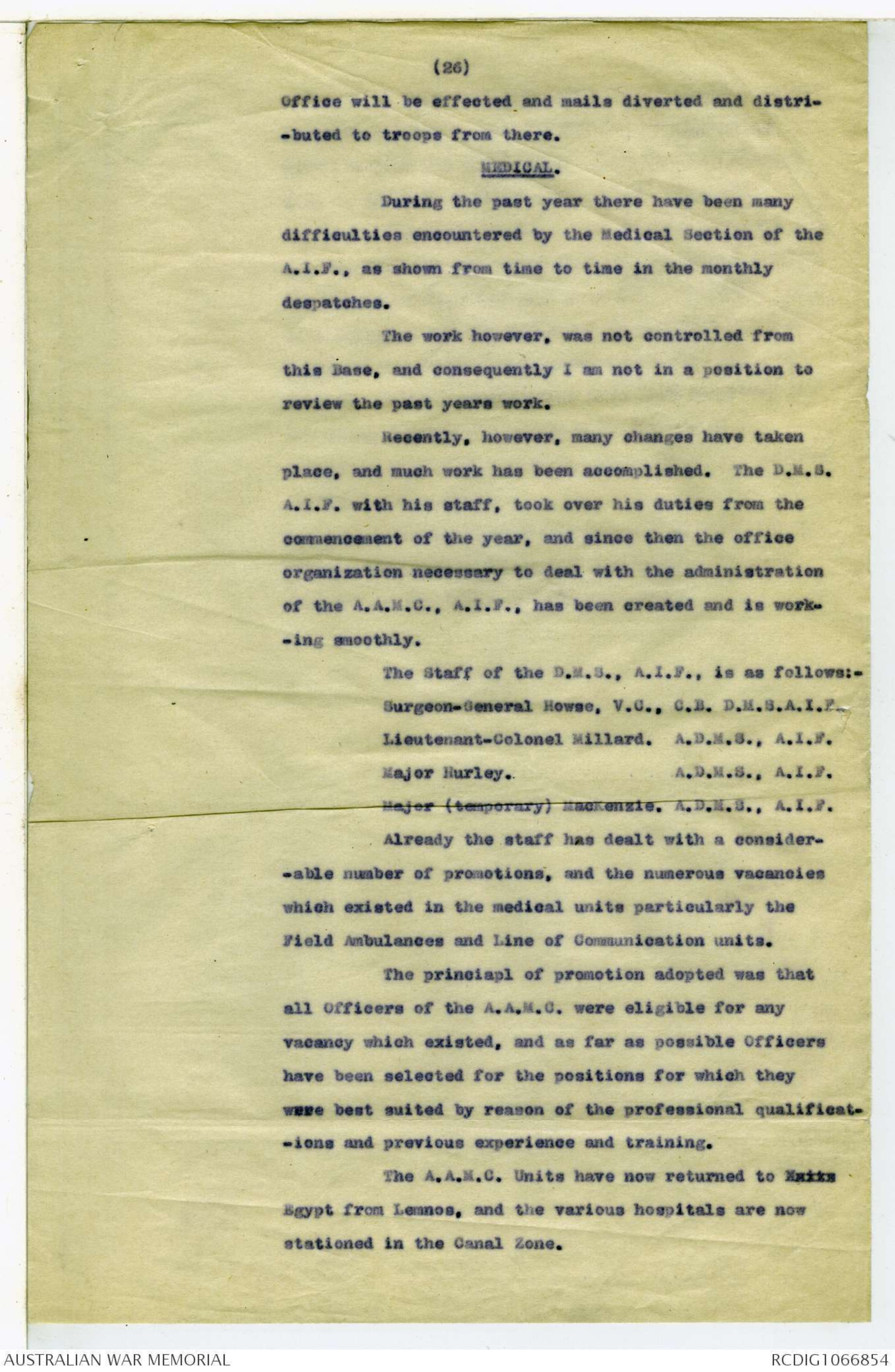
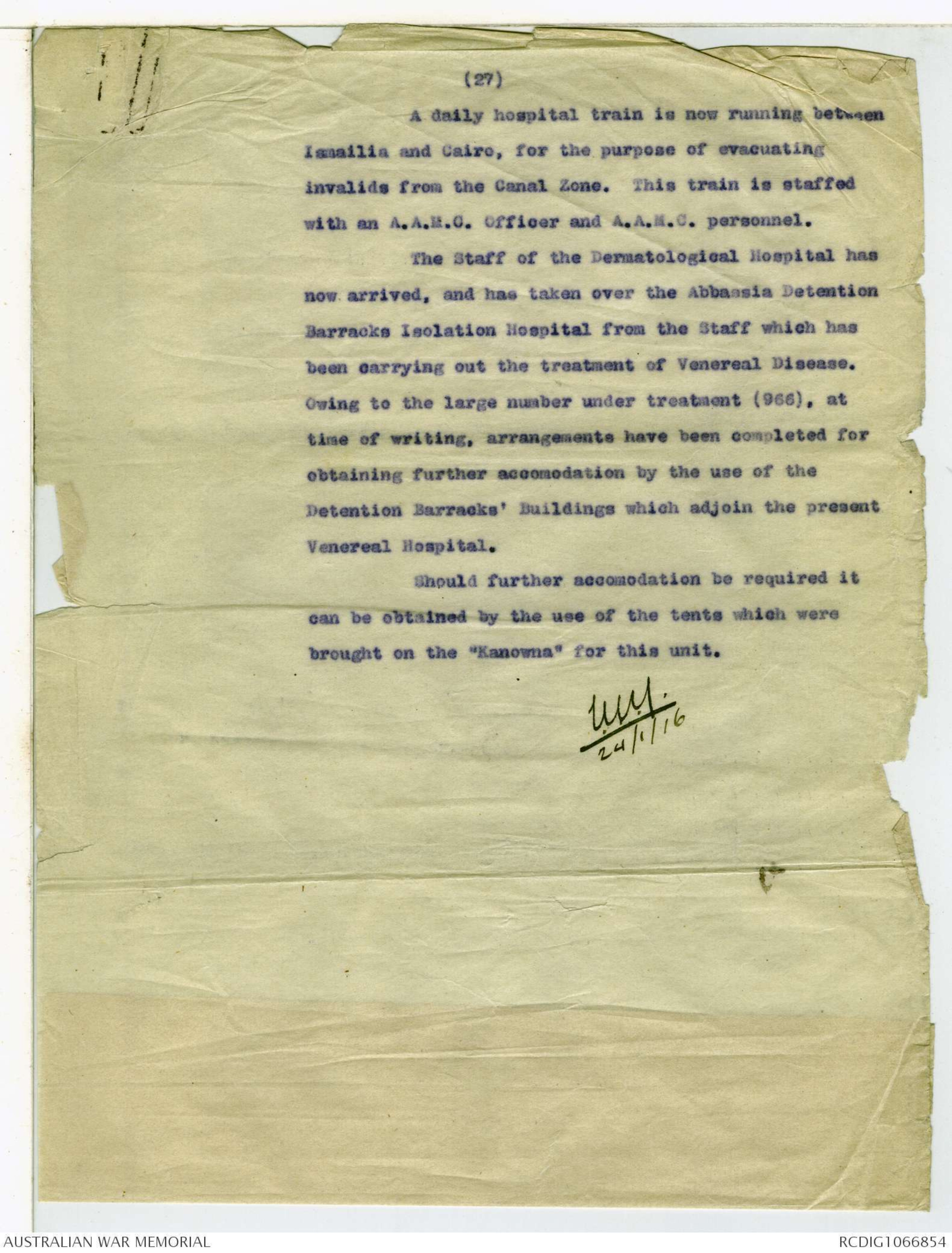
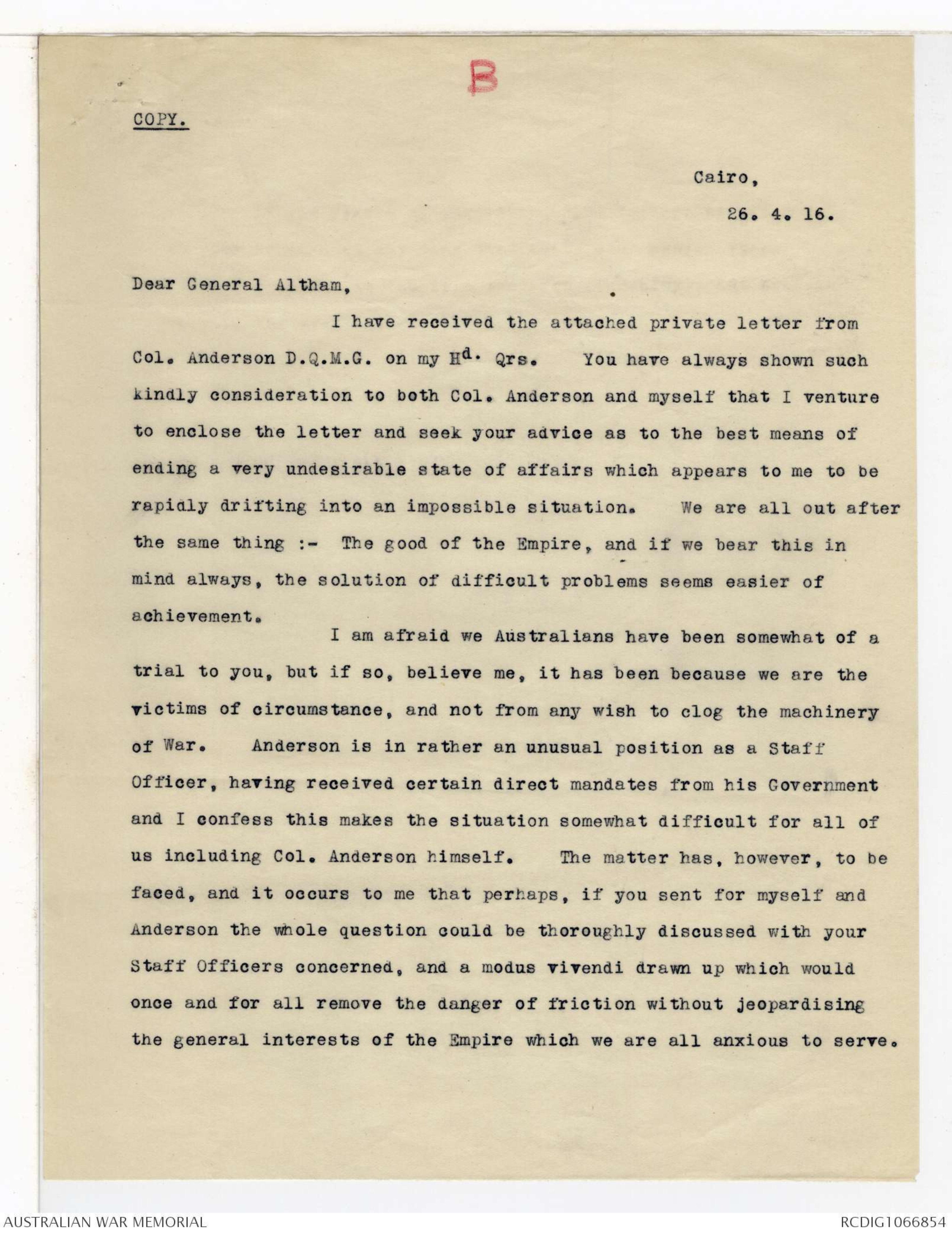
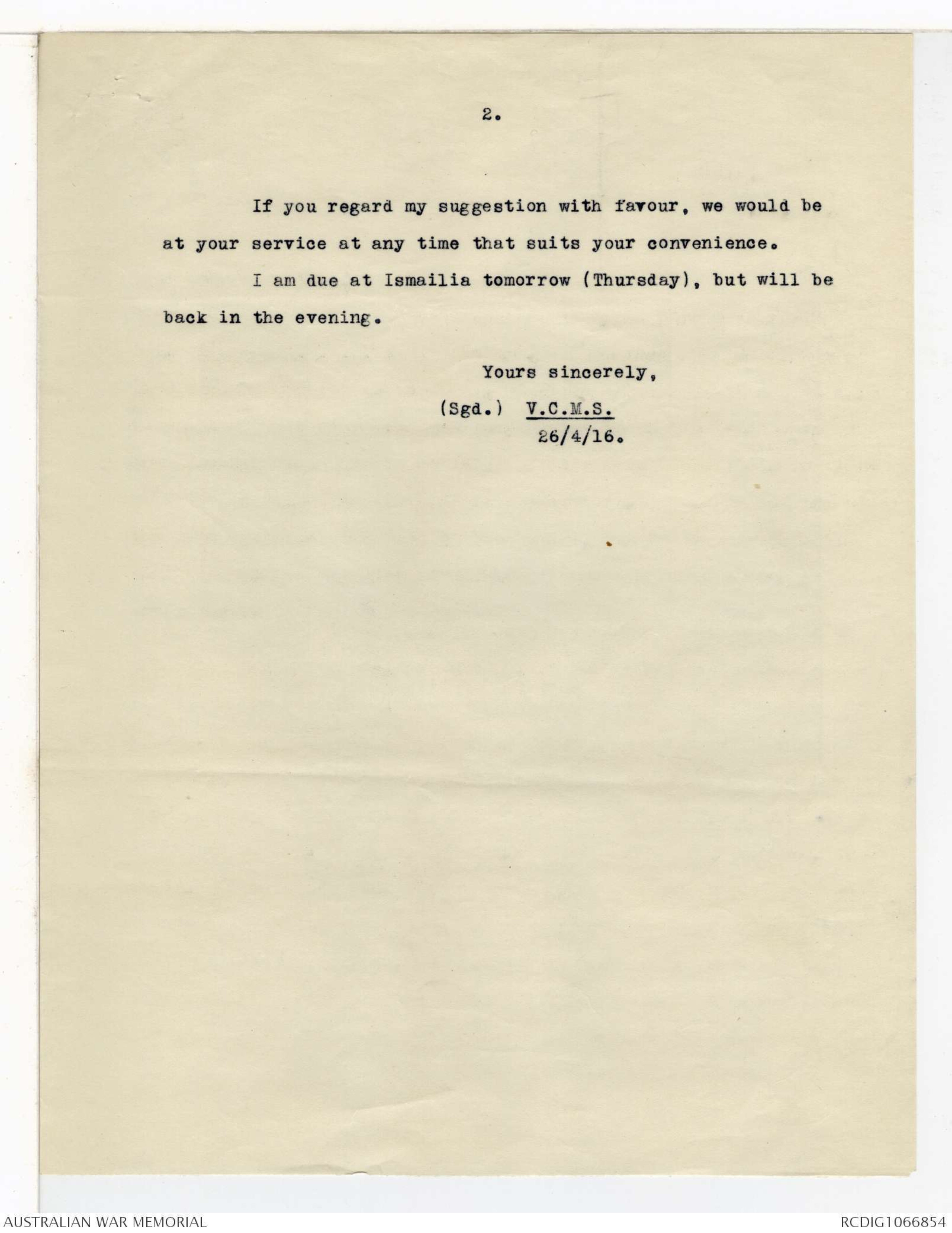
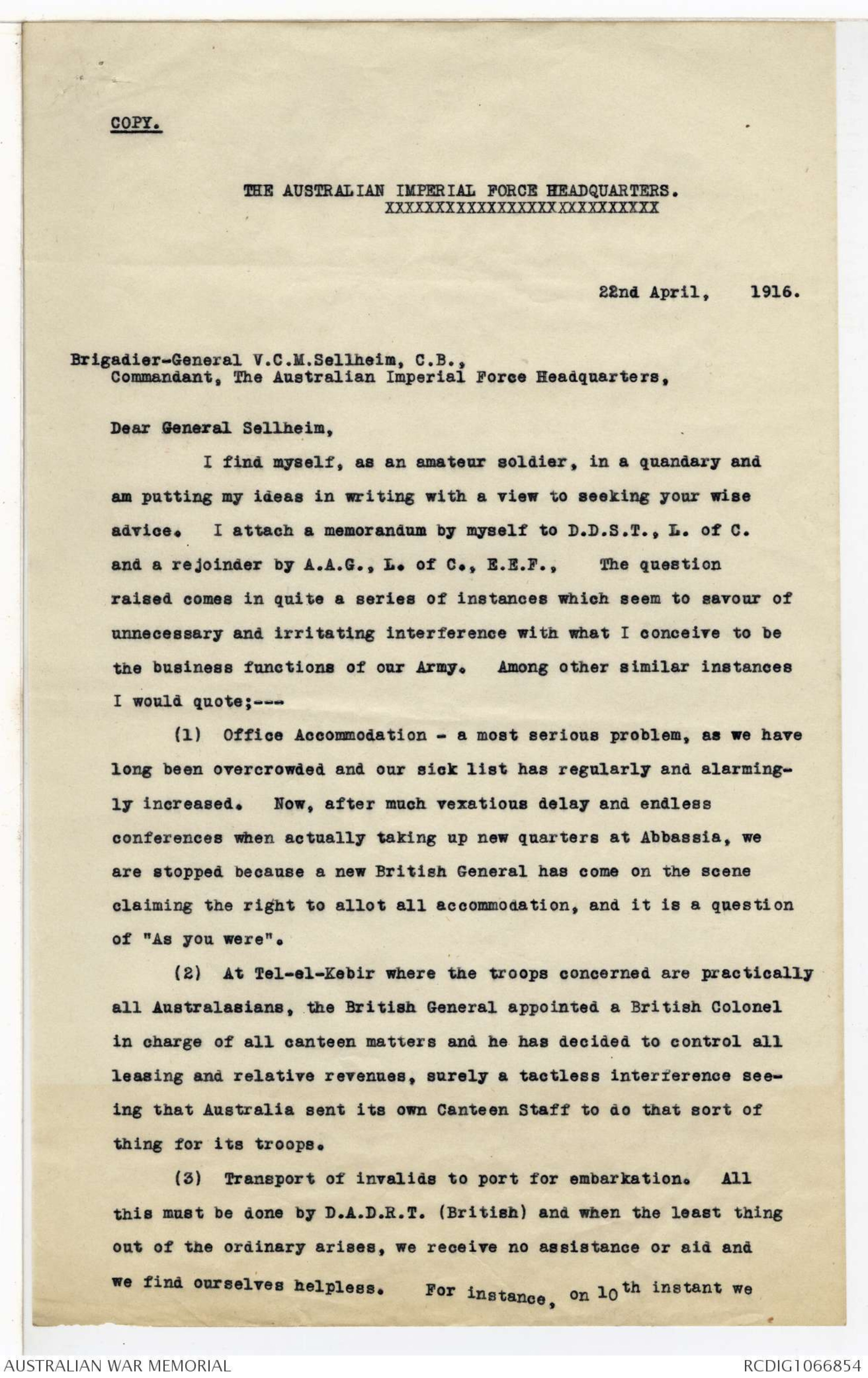
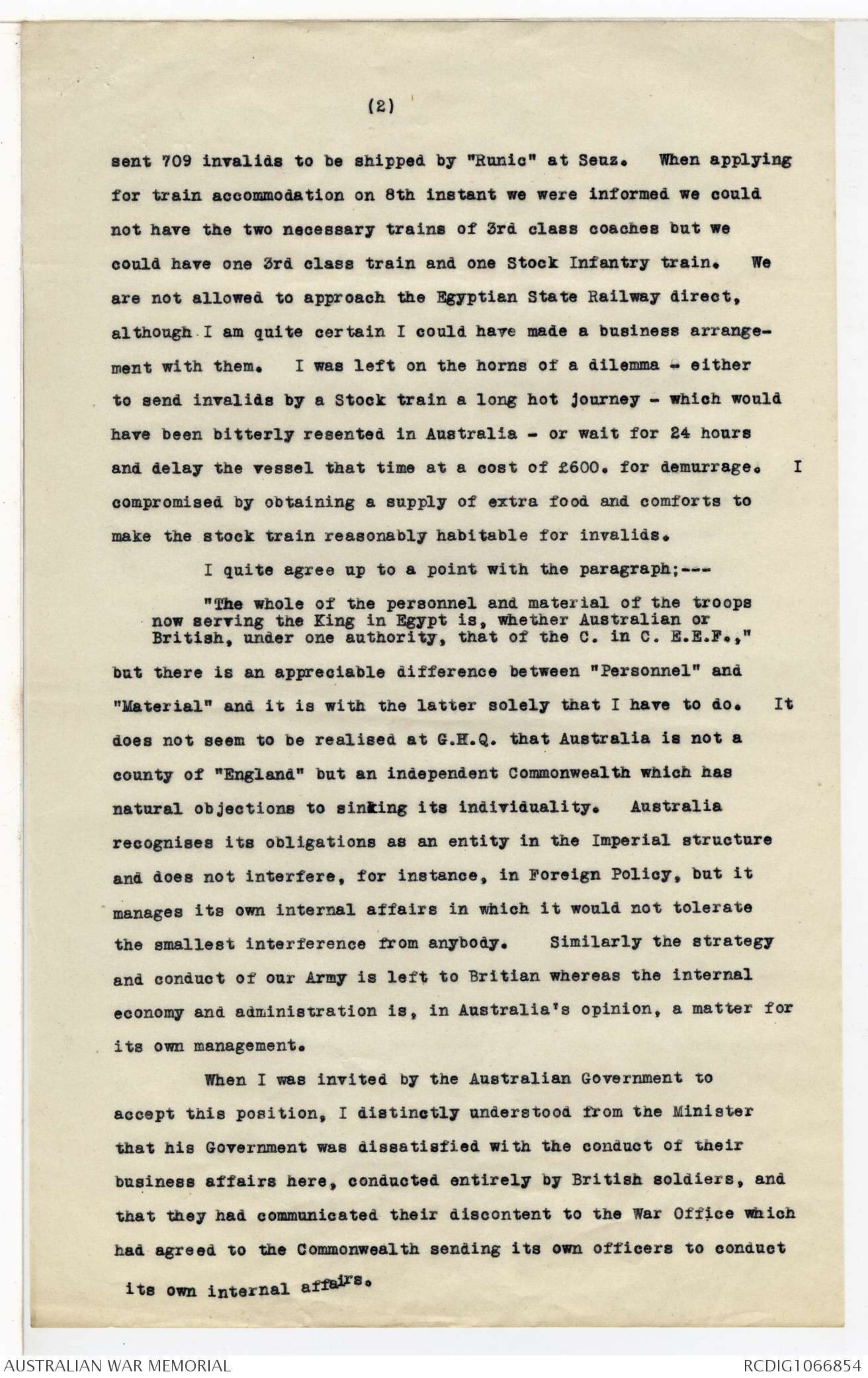
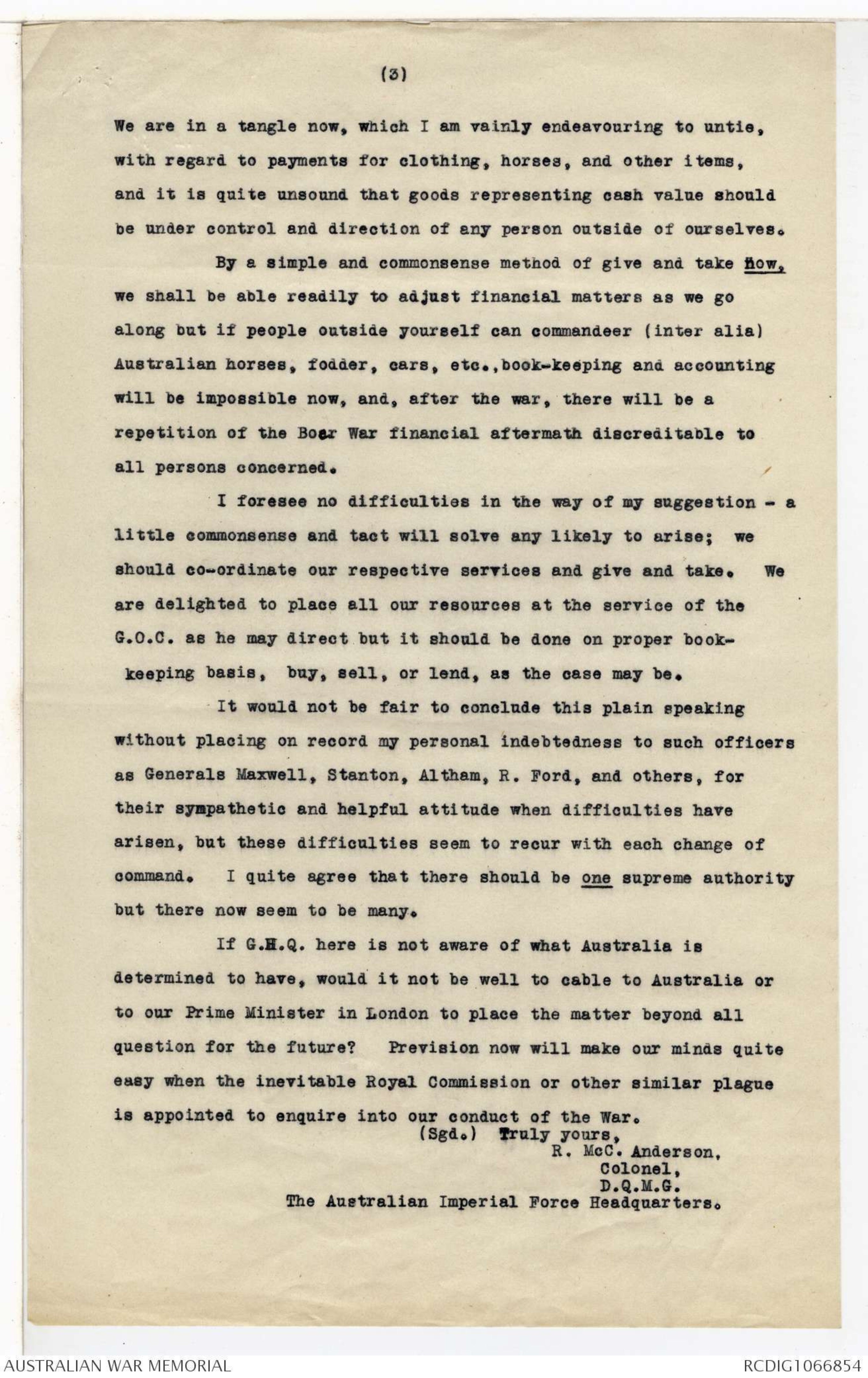
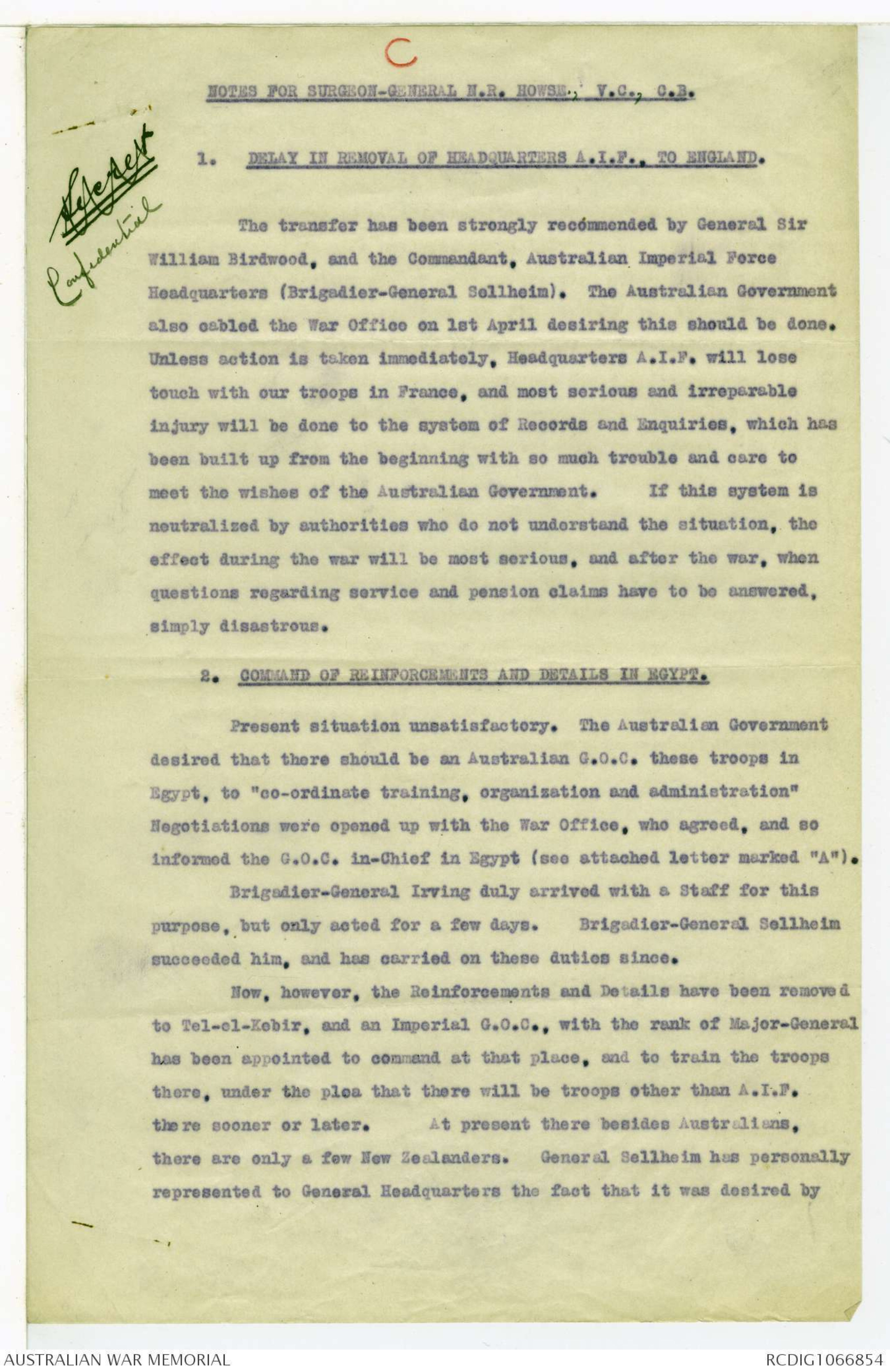
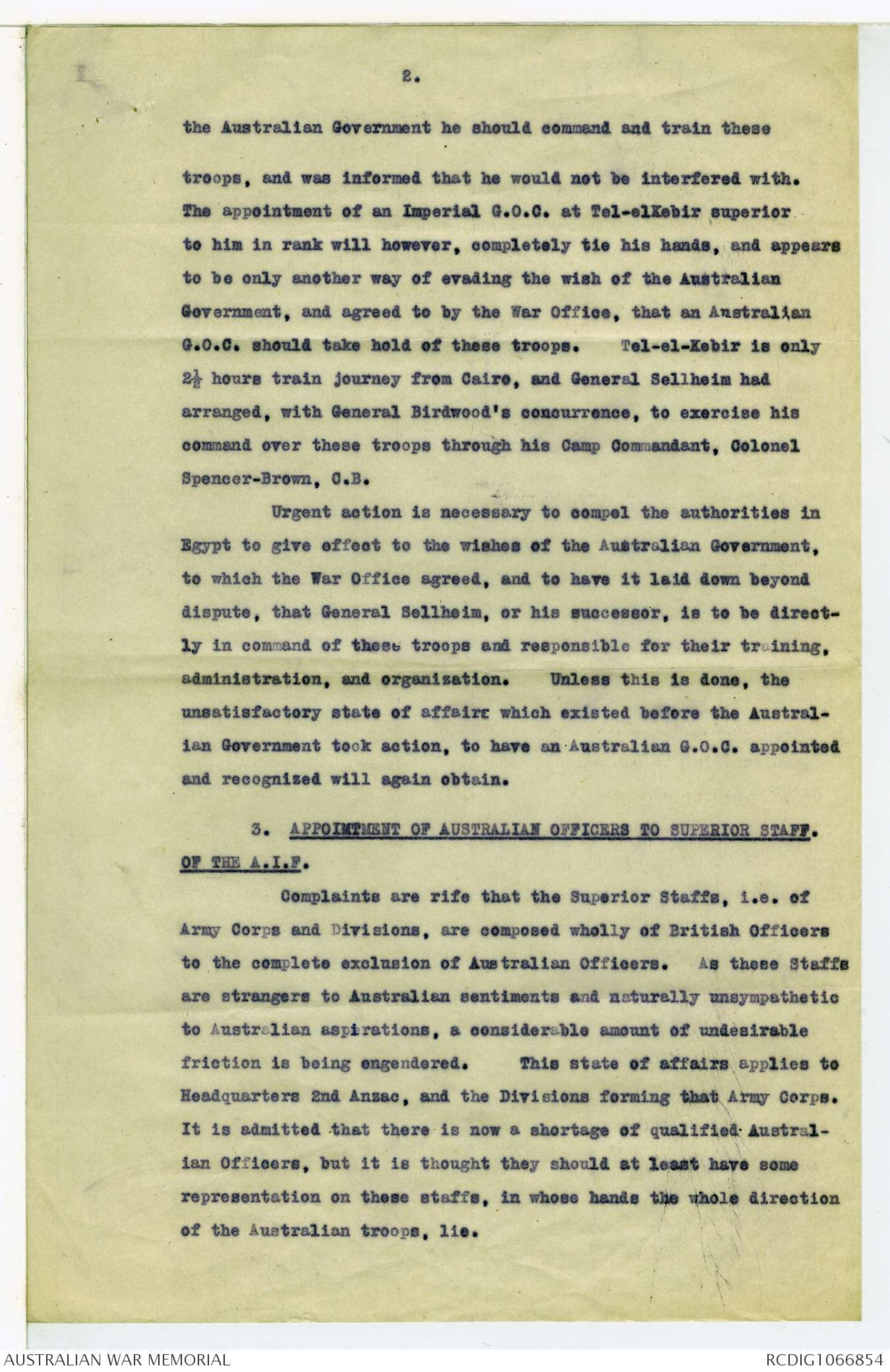
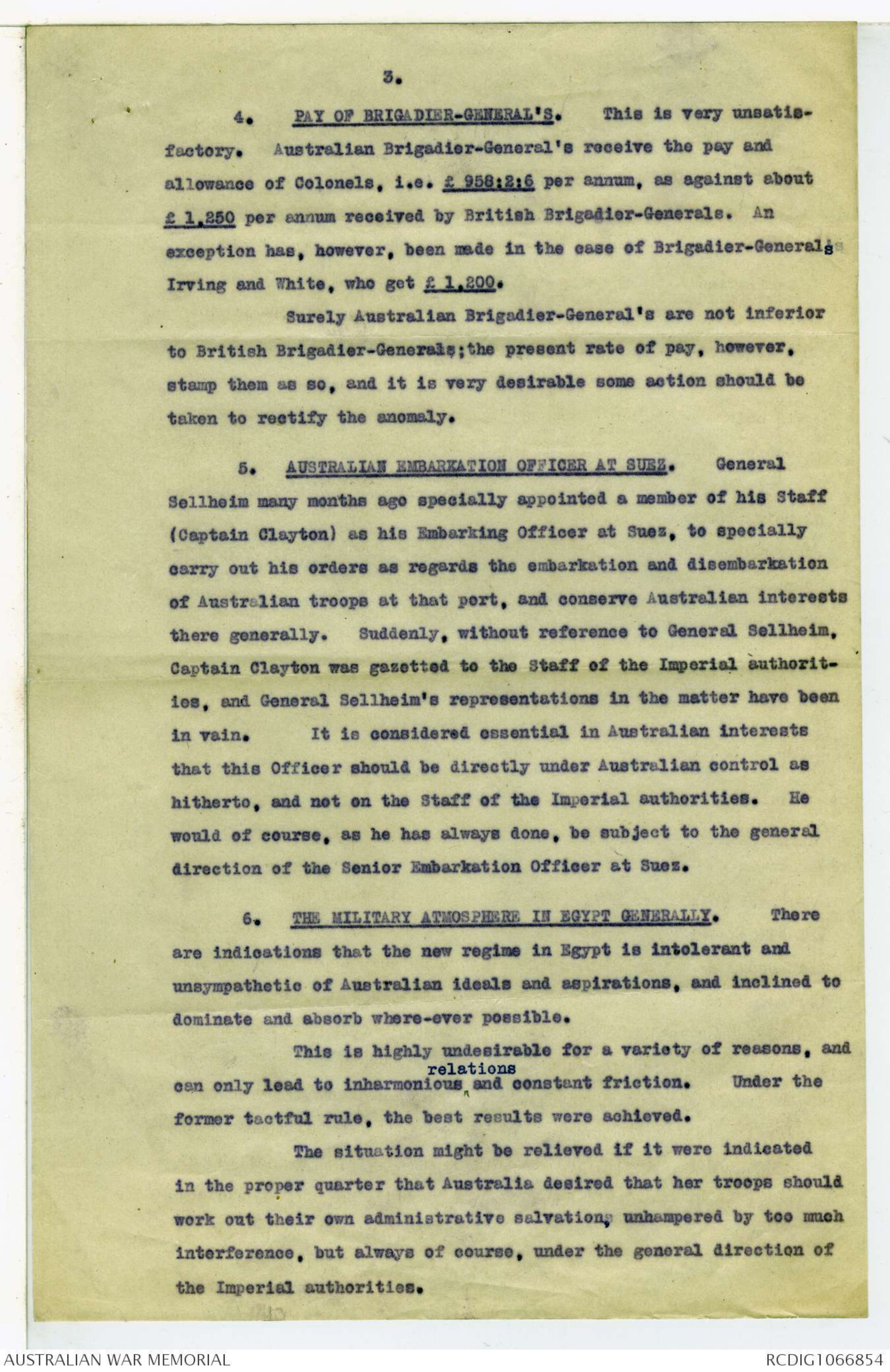
(26)
Office will be effected and mails diverted and distributed
to troops from there.
MEDICAL.
During the past year there have been many
difficulties encountered by the Medical Section of the
A.I.F., as shown from time to time in the monthly
despatches.
The work however, was not controlled from
this Base, and consequently I am not in a position to
review the past years work.
Recently, however, many changes have taken
place, and much work has been accomplished. The D.M.S.
A.I.F. with his staff, took over his duties from the
commencement of the year, and since then the office
organization necessary to deal with the administration
of the A.A.M.C., A.l.F., has been created and is working
smoothly.
The Staff of the D.M.S., A.I.F., is as follows:-
Surgeon-General Howse, V.C., C.B. D.M.S.A.I.F.
Lieutenant-Colonel Millard. A.D.M.S., A.I.F.
Major Hurley. A.D.M.S., A.I.F.
Major (temporary) MacKenzie. A.D.M.S., A.I.F.
Already the staff has dealt with a considerable
number of promotions, and the numerous vacancies
which existed in the medical units particularly the
Field Ambulances and Line of Communication units.
The principal of promotion adopted was that
all Officers of the A.A.M.C. were eligible for any
vacancy which existed, and as far as possible Officers
have been selected for the positions for which they
were best suited by reason of the professional qualifications
and previous experience and training.
The A.A.M.C. Units have now returned to Units
Egypt from Lemnos, and the various hospitals are now
stationed in the Canal Zone.
(27)
A daily hospital train is now running between
Ismailia and Cairo, for the purpose of evacuating
invalids from the Canal Zone. This train is staffed
with an A.A.M.C. Officer and A.A.M.C. personnel.
The Staff of the Dermatological Hospital has
now arrived, and has taken over the Abbassia Detention
Barracks Isolation Hospital from the Staff which has
been carrying out the treatment of Venereal Disease.
Owing to the large number under treatment (966), at
time of writing, arrangements have been completed for
obtaining further accomodation by the use of the
Detention Barracks' Buildings which adjoin the present
Venereal Hospital.
Should further accomodation be required it
can be obtained by the use of the tents which were
brought on the "Kanowna" for this unit.
[?]
24/1/16
[* B *]
COPY.
Cairo
26. 4. 16.
Dear General Altham,
I have received the attached private letter from
Col. Anderson D.Q.M.G. on my Hd. Qrs. You have always shown such
kindly consideration to both Col. Anderson and myself that I venture
to enclose the letter and seek your advice as to the best means of
ending a very undesirable state of affairs which appears to me to be
rapidly drifting into an impossible situation. We are all out after
the same thing :- The good of the Empire, and if we bear this in
mind always, the solution of difficult problems seems easier of
achievement.
I am afraid we Australians have been somewhat of a
trial to you, but if so, believe me, it has been because we are the
victims of circumstance, and not from any wish to clog the machinery
of War. Anderson is in rather an unusual position as a Staff
Officer, having received certain direct mandates from his Government
and I confess this makes the situation somewhat difficult for all of
us including Col. Anderson himself. The matter has, however, to be
faced, and it occurs to me that perhaps, if you sent for myself and
Anderson the whole question could be thoroughly discussed with your
Staff Officers concerned, and a modus vivendi drawn up which would
once and for all remove the danger of friction without jeopardising
the general interests of the Empire which we are all anxious to serve.
2.
If you regard my suggestion with favour, we would be
at your service at any time that suits your convenience.
I am due at Ismailia tomorrow (Thursday), but will be
back in the evening.
Yours sincerely,
(Sgd.) V.C.M.S.
26/4/16.
COPY.
THE AUSTRALIAN IMPERIAL FORCE HEADQUARTERS
XXXXXXXXXXXXXXXXXXXXXXXXXXXX
22nd April, 1916.
Brigadier-General V.C.M.Sellheim, C.B.,
Commandant, The Australian Imperial Force Headquarters,
Dear General Sellheim,
I find myself, as an amateur soldier, in a quandary and
am putting my ideas in writing with a view to seeking your wise
advice. I attach a memorandum by myself to D.D.S.T., L. of C.
and a rejoinder by A.A.G., L. of C., E.E.F., The question
raised comes in quite a series of instances which seem to savour of
unnecessary and irritating interference with what I conceive to be
the business functions of our Army. Among other similar instances
I would quote;---
(1) Office Accommodation - a most serious problem, as we have
long been overcrowded and our sick list has regularly and alarmingly
increased. Now, after much vexatious delay and endless
conferences when actually taking up new quarters at Abbassia, we
are stopped because a new British General has come on the scene
claiming the right to allot all accommodation, and it is a question
of "As you were".
(2) At Tel-el-Kebir where the troops concerned are practically
all Australasians, the British General appointed a British Colonel
in charge of all canteen matters and he has decided to control all
leasing and relative revenues, surely a tactless interference seeing
that Australia sent its own Canteen Staff to do that sort of
thing for its troops.
(3) Transport of invalids to port for embarkation. All
this must be done by D.A.D.R.T. (British) and when the least thing
out of the ordinary arises, we receive no assistance or aid and
we find ourselves helpless. For instance, on 10th instant we
(2)
sent 709 invalids to be shipped by "Runic" at Seuz. When applying
for train accommodation on 8th instant we were informed we could
not have the two necessary trains of 3rd class coaches but we
could have one 3rd class train and one Stock Infantry train. We
are not allowed to approach the Egyptian State Railway direct,
although I am quite certain I could have made a business arrangement
with them. I was left on the horns of a dilemma - either
to send invalids by a Stock train a long hot journey - which would
have been bitterly resented in Australia - or wait for 24 hours
and delay the vessel that time at a cost of £600. for demurrage. I
compromised by obtaining a supply of extra food and comforts to
make the stock train reasonably habitable for invalids.
I quite agree up to a point with the paragraph;---
"The whole of the personnel and material of the troops
now serving the King in Egypt is, whether Australian or
British, under one authority, that of the C. in C. E.E.F.,"
but there is an appreciable difference between "Personnel" and
"Material" and it is with the latter solely that I have to do. It
does not seem to be realised at G.H.Q. that Australia is not a
county of "England" but an independent Commonwealth which has
natural objections to sinking its individuality. Australia
recognises its obligations as an entity in the Imperial structure
and does not interfere, for instance, in Foreign Policy, but it
manages its own internal affairs in which it would not tolerate
the smallest interference from anybody. Similarly the strategy
and conduct of our Army is left to Britian whereas the internal
economy and administration is, in Australia's opinion, a matter for
its own management.
When I was invited by the Australian Government to
accept this position, I distinctly understood from the Minister
that his Government was dissatisfied with the conduct of their
business affairs here, conducted entirely by British soldiers, and
that they had communicated their discontent to the War Office which
had agreed to the Commonwealth sending its own officers to conduct
its own internal affairs.
(3)
We are in a tangle now, which I am vainly endeavouring to untie,
with regard to payments for clothing, horses, and other items,
and it is quite unsound that goods representing cash value should
be under control and direction of any person outside of ourselves.
By a simple and commonsense method of give and take now,
we shall be able readily to adjust financial matters as we go
along but if people outside yourself can commandeer (inter alia)
Australian horses, fodder, cars, etc., book-keeping and accounting
will be impossible now, and, after the war, there will be a
repetition of the Boer War financial aftermath discreditable to
all persons concerned.
I foresee no difficulties in the way of my suggestion - a
little commonsense and tact will solve any likely to arise; we
should co-ordinate our respective services and give and take. We
are delighted to place all our resources at the service of the
G.O.C. as he may direct but it should be done on proper bookkeeping
basis, buy, sell, or lend, as the case may be.
It would not be fair to conclude this plain speaking
without placing on record my personal indebtedness to such officers
as Generals Maxwell, Stanton, Altham, R. Ford, and others, for
their sympathetic and helpful attitude when difficulties have
arisen, but these difficulties seem to recur with each change of
command. I quite agree that there should be one supreme authority
but there now seem to be many.
If G.H.Q. here is not aware of what Australia is
determined to have, would it not be well to cable to Australia or
to our Prime Minister in London to place the matter beyond all
question for the future? Prevision now will make our minds quite
easy when the inevitable Royal Commission or other similar plague
is appointed to enquire into our conduct of the War.
(Sgd.) Truly yours.
R. McC. Anderson,
Colonel,
D.Q.M.G.
The Australian Imperial Force Headquarters.
[* C *]
[* Secret
Confidential *]
NOTES FOR SURGEON-GENERAL N.R. HOWSE., V.C., C.B.
1. DELAY IN REMOVAL OF HEADQUARTERS A.I.F. TO ENGLAND.
The transfer has been strongly recommended by General Sir
William Birdwood, and the Commandant, Australian Imperial Force
Headquarters (Brigadier-General Sellheim). The Australian Government
also cabled the War Office on 1st April desiring this should be done.
Unless action is taken immediately, Headquarters A.I.F. will lose
touch with our troops in France, and most serious and irreparable
injury will be done to the system of Records and Enquiries, which has
been built up from the beginning with so much trouble and care to
meet the wishes of the Australian Government. If this system is
neutralized by authorities who do not understand the situation, the
effect during the war will be most serious, and after the war, when
questions regarding service and pension claims have to be answered,
simply disastrous.
2. COMMAND OF REINFORCEMENTS AND DETAILS IN EGYPT.
Present situation unsatisfactory. The Australian Government
desired that there should be an Australian G.O.C. these troops in
Egypt, to "co-ordinate training, organization and administration"
Negotiations were opened up with the War Office, who agreed, and so
informed the G.O.C. in-Chief in Egypt (see attached letter marked "A").
Brigadier-General Irving duly arrived with a Staff for this
purpose, but only acted for a few days. Brigadier-General Sellheim
succeeded him, and has carried on these duties since.
Now, however, the Reinforcements and Details have been removed
to Tel-el-Kebir, and an Imperial G.O.C., with the rank of Major-General
has been appointed to command at that place, and to train the troops
there, under the plea that there will be troops other than A.I.F.
there sooner or later. At present there besides Australians,
there are only a few New Zealanders. General Sellheim has personally
represented to General Headquarters the fact that it was desired by
2.
the Australian Government he should command and train these
troops, and was informed that he would not be interfered with.
The appointment of an Imperial G.O.C. at Tel-elKebir superior
to him in rank will however, completely tie his hands, and appears
to be only another way of evading the wish of the Australian
Government, and agreed to by the War Office, that an Australian
G.O.C. should take hold of these troops. Tel-el-Kebir is only
2½ hours train journey from Cairo, and General Sellheim had
arranged, with General Birdwood's concurrence, to exercise his
command over these troops through his Camp Commandant, Colonel
Spencer-Brown, C.B.
Urgent action is necessary to compel the authorities in
Egypt to give effect to the wishes of the Australian Government,
to which the War Office agreed, and to have it laid down beyond
dispute, that General Sellheim, or his successor, is to be directly
in command of these troops and responsible for their training,
administration, and organization. Unless this is done, the
unsatisfactory state of affairs which existed before the Australian
Government took action, to have an Australian G.O.C. appointed
and recognized will again obtain.
3. APPOINTMENT OF AUSTRALIAN OFFICERS TO SUPERIOR STAFF.
OF THE A.I.F.
Complaints are rife that the Superior Staffs, i.e. of
Army Corps and Divisions, are composed wholly of British Officers
to the complete exclusion of Australian Officers. As these Staffs
are strangers to Australian sentiments and naturally unsympathetic
to Australian aspirations, a considerable amount of undesirable
friction is being engendered. This state of affairs applies to
Headquarters 2nd Anzac, and the Divisions forming that Army Corps.
It is admitted that there is now a shortage of qualified Australian
Officers, but it is thought they should at least have some
representation on these staffs, in whose hands the whole direction
of the Australian troops, lie.
3.
4. PAY OF BRIGADIER-GENERAL'S. This is very unsatisfactory.
Australian Brigadier-General's receive the pay and
allowance of Colonels, i.e. £ 958:2:6 per annum, as against about
£ 1,250 per annum received by British Brigadier-Generals. An
exception has, however, been made in the case of Brigadier-Generals
Irving and White, who get £ 1,200.
Surely Australian Brigadier-General's are not inferior
to British Brigadier-Generals; the present rate of pay, however,
stamp them as so, and it is very desirable some action should be
taken to rectify the anomaly.
5. AUSTRALLAN EMBARKATION OFFICER AT SUEZ. General
Sellheim many months ago specially appointed a member of his Staff
(Captain Clayton) as his Embarking Officer at Suez, to specially
carry out his orders as regards the embarkation and disembarkation
of Australian troops at that port, and conserve Australian interests
there generally. Suddenly, without reference to General Sellheim,
Captain Clayton was gazetted to the Staff of the Imperial authorities,
and General Sellheim's representations in the matter have been
in vain. It is considered essential in Australian interests
that this Officer should be directly under Australian control as
hitherto, and not on the Staff of the Imperial authorities. He
would of course, as he has always done, be subject to the general
direction of the Senior Embarkation Officer at Suez.
6. THE MILITARY ATMOSPHERE IN EGYPT GENERALLY. There
are indications that the new regime in Egypt is intolerant and
unsympathetic of Australian ideals and aspirations, and inclined to
dominate and absorb where-ever possible.
This is highly undesirable for a variety of reasons, and
can only lead to inharmonious relations and constant friction. Under the
former tactful rule, the best results were achieved.
The situation might be relieved if it were indicated
in the proper quarter that Australia desired that her troops should
work out their own administrative salvation, unhampered by too much
interference, but always of course, under the general direction of
the Imperial authorities.
 Transcriber 27924
Transcriber 27924This transcription item is now locked to you for editing. To release the lock either Save your changes or Cancel.
This lock will be automatically released after 60 minutes of inactivity.